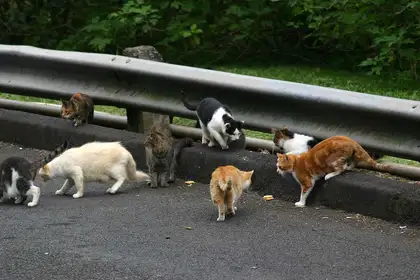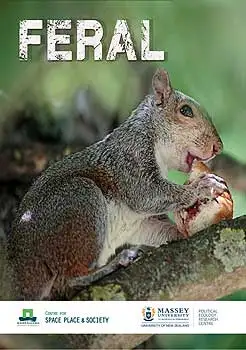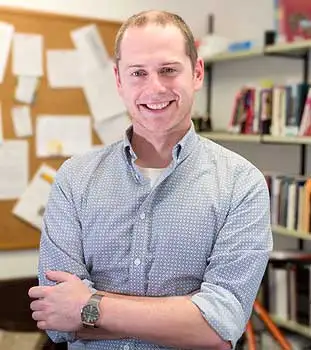
Feral cats are among topics in an online conference about human responses to nature, wilderness and the meaning of 'feral' (image/Wikimedia Commons)
Possums, privet, rats, ragwort, stoats, goats and gorse – the status of invasive species in New Zealand such as these are part of a broader, global discussion in a conference exploring how we perceive and manage nature, and why we treat certain species as enemies.
Science has names, categories, definitions and systems to understand the natural world – but labelling something a ‘pest’ or a ‘weed’ is cultural, not scientific, says Dr Nicholas Holm, co-convener of Feral, an online conference which will explore ideas about the human relationship to nature and wilderness.
The cross-disciplinary event involving biological and social scientists, artists and philosophers, runs over three weeks from this week and is hosted by Massey University’s Political Ecology Research Centre (PERC) in conjunction with the Wageningen University Centre for Space, Place and Society (Netherlands).
Participants from all corners of the world will be presenting, discussing and thinking about how the idea of ‘feral’ works as a way of organising our understanding of the natural world, and in particular as a name for forms of nature that have spurned human control or expectations, says Dr Holm, a cultural studies lecturer in the School of English and Media Studies, based at Massey’s Wellington campus.

Feral conference poster.
“Our participants are talking about topics like conservation, biosecurity, invasive species, urban animals and pests, re-wilding and a bunch of other associated ideas,” he says. The title is a provocation to the mindset that we must eliminate species that interfere with our idea of how to control and manage nature in accordance with our human agenda. In that vein, he published a paper called Consider the Possum: Foes, Anti-Animals, and Colonists in Paradise, (Animal Studies Journal, 2015) and another on the way we view and value ‘vermin,’ such as squirrels.
At a time when global eco-systems are under threat from human-induced climate change and numerous fragile eco-systems around the world are in a state of rapid change, it is timely to examine how we relate to and value nature, he argues. It is also relevant to question assumptions about why we value certain species of plant or animal – whether for cultural or economic reasons – and the implications of this for how we think about ecology and conservation.
Even concepts like ‘pest-free’ need to be questioned, says Dr Holm, and keynote speaker Mark Davis will tackle this in the first of three weeks of online presentations and panel discussions. He is the DeWitt Wallace Professor of Biology at Macalester College, where he has been a faculty member since 1981. His research, writings, and presentations focus on the ecology of introduced species and the field of invasion biology.
Other top keynote speakers include the noted international environmental journalist Fred Pearce, along with presenters from Europe, Canada, United Kingdom, Australia and South America, as well as locals, who will cover topics including conservation; systems and flows; feral biopolitics; feral art; farming and food; and feral populations – from dogs and cats to horses and kangaroos, as well as jellyfish, mussels and even feral students.

Dr Nick Holm.
New Zealand-focussed topics include on-farm biodiversity, and the history of feral rabbits and wallabies while international themes include feral gardening, the plight of the polar bear in Canada, a feral business school in England and the role of ballet, poetry and theatre in articulating and highlighting climate change impacts and environmental decline.
The event will take the form of on an ‘online conference.’ Starting November 12, for three weeks the conference website will be hosting a series of panels composed of videos made by presenters, and discussion forums. Each week the conference will host a keynote presentation and a series of panels, with new material opening up each week. The conference is free and open to anyone.
The conference is tagged ‘nearly carbon neutral’ as it brings people together online and across time zones and national boundaries without the huge costs and environmental impact from travel, accommodation, hosting and other material resources that a conventional conference requires.
Conference website: (http://perc.ac.nz/wordpress/feral/)